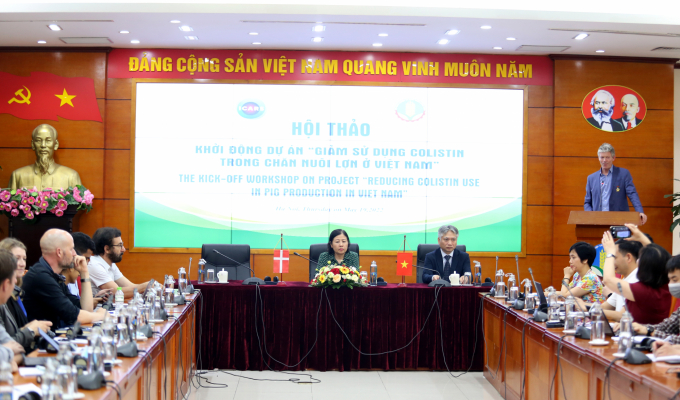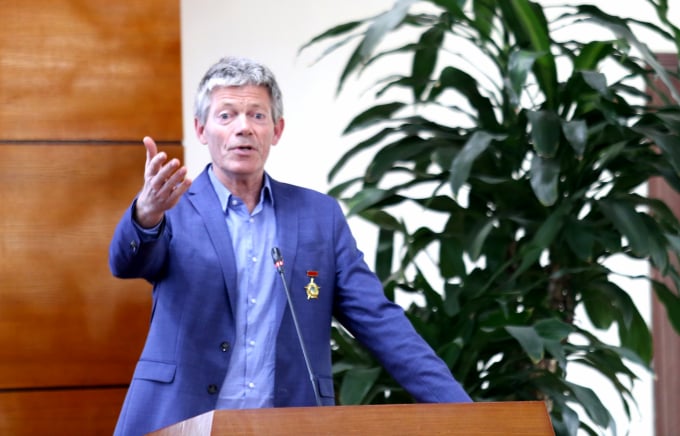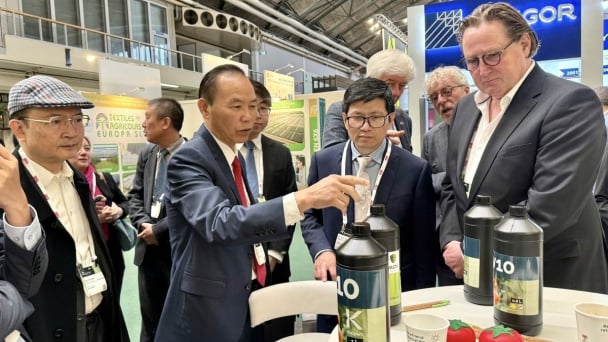June 14, 2025 | 14:20 GMT +7
June 14, 2025 | 14:20 GMT +7
Hotline: 0913.378.918
June 14, 2025 | 14:20 GMT +7
Hotline: 0913.378.918

Kick-off workshop on the project: “reducing colistin use in pig production in Vietnam”. Photo: Minh Phuc.
On May 19, the Ministry of Agriculture and Rural Development (MARD) and the International Centre for Antimicrobial Resistance Solutions (ICARS) of Denmark co-chaired the kick-off workshop on the project: “reducing colistin use in pig production in Vietnam”.
Currently, colistin - the antibiotic medication is frequently used in animal health to treat diseases relating to the gastrointestinal tract of pigs such as enteritis, diarrhea, and intestinal infections such as Ecoli. However, the widespread and uncontrolled use of colistin in livestock production has raised the danger of spreading antibiotic-resistant bacteria and antibiotic residues in foods.
On a worldwide scale, the use of colistin in livestock production should be stopped or at least be considered the last-resort treatment.
Mr. Chu Duc Huy - project coordinator informed that it aims to assist and encourage the development of sustainable pig production by minimizing the usage of colistin and other anti-bacterial agents, consequently reducing the state of antibiotic resistance in the national swine value chain. Besides, the project will help strengthen the management, and formulation of laws and policies aiming to limit the usage of colistin and other anti-bacterial drugs in pig production.
To realize the goal, the project comprises four components including colistin use in pig production; intervention measures to reduce colistin use to control post-weaning diarrhea in piglets; strengthening legal sanctions on reducing colistin use in pig production in Vietnam; capacity building, dissemination, and receiving of research. The project is implemented within 4 years with a total cost of roughly USD 605,000.
The project will focus on piloting solutions in colistin use reduction, contributing to supporting the National Action Plan on prevention and combat antibiotic resistance in agriculture during 2021-2025, as well as examining the execution and administration of policies, and good practices in management and use of colistin.
The project’s result will be integrated with other research on policy impacts, given as evidence, improving legislation, and supporting the review, modification, change, and application of new policies of antibiotic effectiveness in pig production.
Ms. Ngo Thi Kim Cuc - Vice Director-General of the National Institute of Animal Science shared that to implement the project "Intervention projects to reduce the use of colistin to control post-weaning diarrhea in piglets", the Institute will launch three experiments, to test the effectiveness of vaccination use in mother pigs to create antibodies for piglets after birth; using drugs, antibiotics to replace colistin and zinc oxide in the prevention and treatment of diarrhea in piglets.

Prof. Anders Dalsgaard, a high-ranking specialist of ICARS. Photo: Minh Phuc.
Prof. Anders Dalsgaard, a high-ranking specialist of ICARS, and Director of the Project from Denmark mentioned that roughly 50 percent of the antibiotic amount consumed in livestock production via animal feeds. China did ban colistin use some recent years to evaluate the implications of the antibiotic-resistance, the advancement of antibiotic resistance in pigs as well as antibiotic-resistance in the human immune system. Therefore, the animal health sector in Vietnam needs to develop alternative methods for colistin use in veterinary.
Translated by Linh Linh

(VAN) The Department of Agriculture in South Africa has announced the country’s first mass vaccination of poultry to prevent local birds from contracting avian influenza.

(VAN) Establishment of the Mekong Delta Regional Agricultural Linkage Center, aiming for a closed value chain, deep processing, trading platforms, and international market connectivity.

(VAN) Gia Lai province has recently recorded 460 rare species of animals and plants, contributing to forest conservation and biodiversity planning in the region.

(VAN) Ms. Caroline Beresford, New Zealand Ambassador to Vietnam, expressed confidence that agricultural cooperation between Vietnam and New Zealand will develop sustainably, be climate-resilient, and promote gender equality.

(VAN) Vietnam reaffirms its commitment to international cooperation in fostering sustainable and responsible fisheries while ensuring resilient livelihoods for small-scale fishing communities.

(VAN) More than just a technical solution, science and technology are gradually becoming a cornerstone in Vietnam’s journey toward building a circular economy.

(VAN) The Netherlands is ready to accompany Vietnam in building a green, circular, and sustainable agriculture sector that is resilient to climate change.